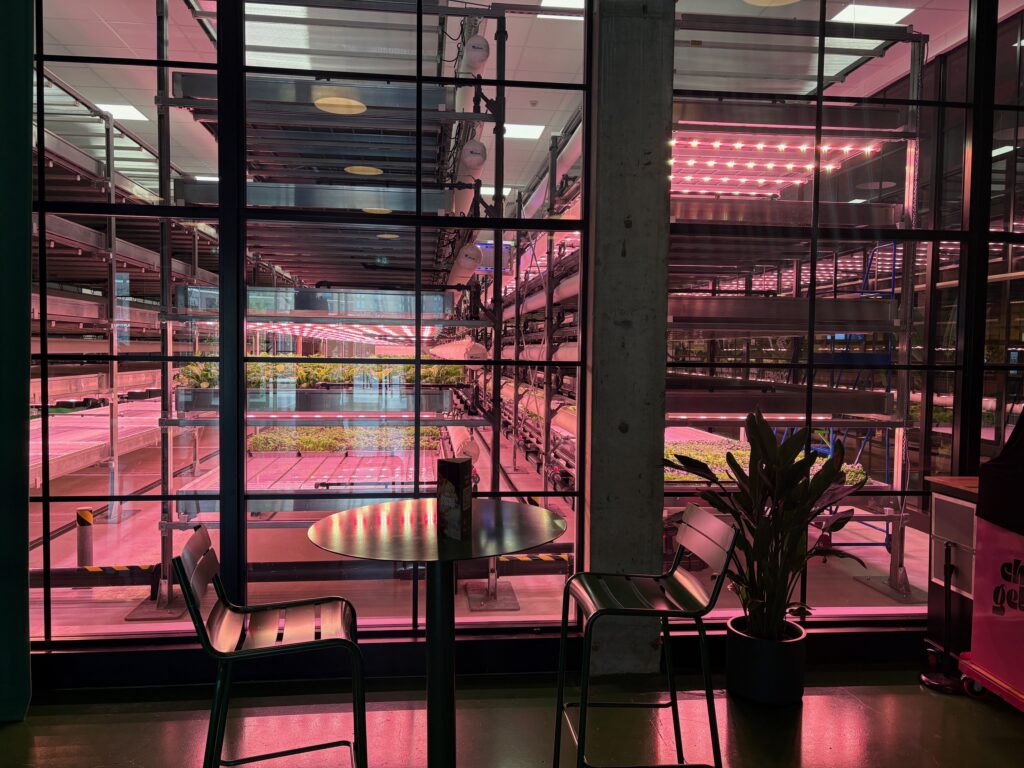Outstanding in their fields
Petersham Nurseries’ restaurant grew from within the Richmond-based nursery as a café for its green-fingered shoppers, and along with providing top-notch food, it has cultivated destination-venue status from diners enjoying being surrounded by flowers and plants.
It has been a similar story at Supawan Thai restaurant in London’s King’s Cross, whose dining room has extended out from a flower shop, which gave a fresh, colourful vibe to the fiery produce delivered onto the plates of its customers.
As well as providing a talking-point-worthy backdrop, plants are increasingly finding their way into dining rooms and kitchens for actual use in dishes as a result of the growing trend of using hydroponics and vertical farming. This involves cultivating plants without soil, often with automated systems controlling lighting (LEDs), temperature and humidity in a controlled environment including sealed cabinets.
Hydroponics used at great scale in vast vertical farms attracted lots of Silicon Valley money have all pretty much failed, but this has not meant the death of such efficient plant-growing because the technique is being adopted by a growing number of hospitality companies across the sector.
These include high-end kitchens such as The Ritz and The Goring Hotel and independent restaurants including Roe and Fallow in London and Elements in Glasgow, along with Kerb at Corner Corner in Canada Water and various foodservice companies such as Compass, BaxterStorey and the Sodexo-owned The Good Eating Company. The latter has introduced vertical farms into venues such as The Orangery Restaurant in the capital.
They all have the same underlying reasons for implementing such solutions. Gary Townsend, chef owner of Elements in Glasgow, uses a solution from Evogro and puts it best: “We have cut down our plant wastage by around 75%. We’re not binning half-used trays or guessing what we’ll need. If we’re growing it ourselves, we only grow what we’re going to use. That saves cost, reduces our footprint and keeps the kitchen lean. And of course, there’s the environmental side. Instead of shipping herbs across the country, they grow a few metres from the pass. That’s local sourcing taken to the next level.”
Each business must then make the individual decision on whether or not they involve the hydroponic growing as an integral part of their venue, with diners sitting in among the greenery. For Townsend, the fridge-sized cabinet from Evogro sits in his kitchen, whereas at Corner Corner, where the kit is supplied by Harvest London, it is fully visible to diners and visitors. It feeds a variety of herbs and green leafs into the two on-site kitchens that house four operators curated by Kerb – Café by Sireli, Masa Tacos, Chick N Sours and Jou Jou Bites.
The plan is to fully engage with visitors and the local community, and so packages are being devised that include cocktails, a tour of the ‘farm’ and dinner using the on-site ingredients. Such engagement is also a crucial aspect of The Orangery Restaurant, whose vertical farm comes from Square Mile Farms. On the ground-floor restaurant is a 15-metre wall of vertically-growing plants that are harvested for workers in the offices above, while in the basement alongside the kitchen sits an impressive farm of 20,000 plants supplying as much as 80kg of green leaves into the restaurant each week.
In amid this sea of greenery sits the private dining room that is definitely one up on the Petersham Nurseries experience. But the use of vertical farming should not be seen as one-upmanship among smarter venues because its use is filtering down into the mainstream market.
Consider Pizza Pilgrims, where Basil has been an extremely wasteful ingredient for its pizzas in the past. But since the chain began working with Harvest London to supply the fresh ingredient, its order has fallen from six tonnes with its former supplier to only four tonnes with Harvest because of the 30% reduction in waste it now enjoys.
With such gains being achieved, we will inevitably see a growing number of brands at all price points within the market dabbling with vertical farms and hydroponics within their supply chains in some way or other, because it will enable them to boost a whole of host of different key performance indicators that ultimately improve margins and deliver a better customer experience.
Glynn Davis, editor, Retail Insider
This piece was originally published on Propel Info where Glynn Davis writes a regular Friday opinion piece. Retail Insider would like to thank Propel for allowing the reproduction of this column.


